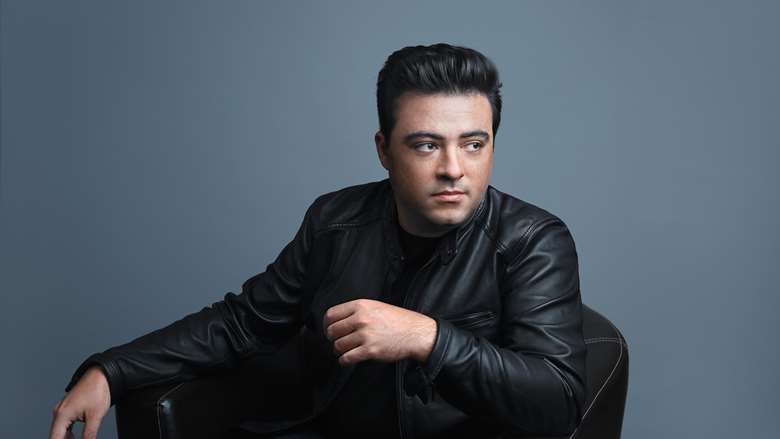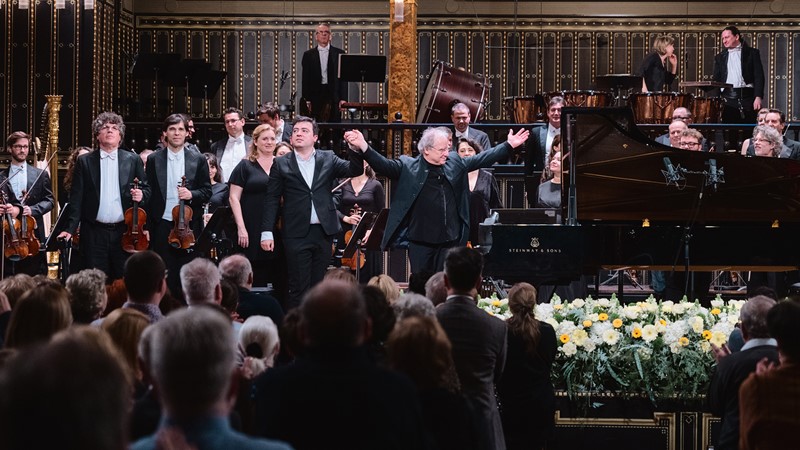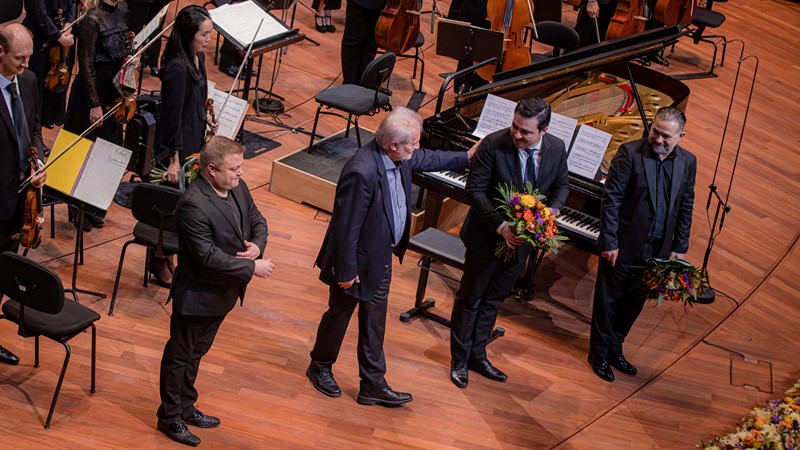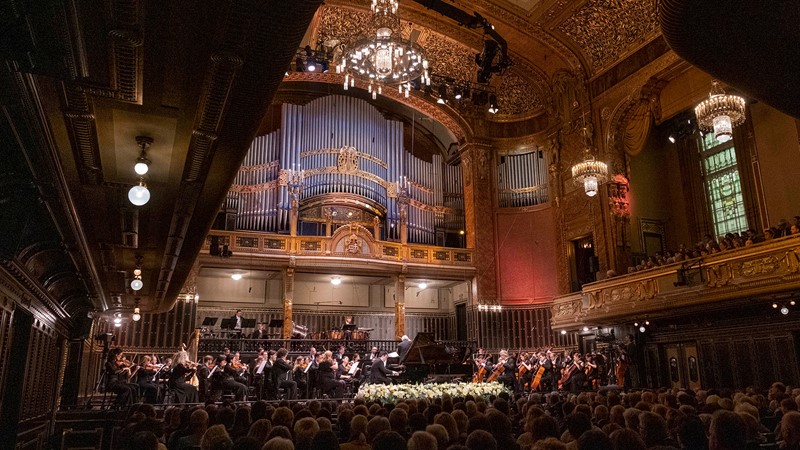Hungary’s rising star: János Balázs in conversation
SponsoredThursday, February 15, 2024
János Balázs talks to Jack Pepper about exploring Rachmaninov, Hungarian gypsy music and a new piano concerto by Péter Eötvös that pays tribute to his pianist role model, György Cziffra

Rachmaninov’s 150th anniversary celebrations continue in style with the Concerto Budapest Symphony Orchestra and András Keller, who are joined by János Balázs this month in performances of all of Rachmaninov’s piano concertos and the Rhapsody On A Theme Of Paganini.
Aged 35, Balázs is a recipient of the European Concert Hall Organisation Rising Star ‘Artist of the Season’ Award and a Young Steinway Artist, has collaborated with Gábor Takács-Nagy, Iván Fischer, Misha Maisky and Jose Cure and appeared everywhere from the Wiener Konzerthaus to London’s Barbican Centre.
Exploring Rachmaninov, Hungarian gypsy music and a new piano concerto by Péter Eötvös that pays tribute to his pianist role model, Jack Pepper finds out more…
JP: What does Rachmaninov mean to you?
JB: I consider him the heir of Liszt's legacy, as he was at the top of his game internationally as a pianist, composer and conductor. Not many people are all three! He wrote beautiful melodies, while the climaxes – near volcanic eruptions – are unparalleled. It is precisely these emotional climaxes that I want to underline when performing his piano concertos. Rachmaninov for me was ‘in the flow’, representing the highest romantic period of music, even though he lived in the 20th century. I think it’s some of the most honest and powerful music ever written for piano.
You’re playing all four concertos and the Paganini Rhapsody in two concerts, a major physical as well as musical challenge. Is there something that you notice develops as you play through the cycle?
The first concerto is his Opus One, his first work; the Paganini Rhapsody is one of his last pieces, and so the four concertos and his rhapsody are a good way to give the public the essence of Rachmaninov. But I don’t see performing the whole cycle in a month as a sport; think of it more as a long-haul trip. For the audience, it’s a chance to take out a chunk of time and focus on the music. For me, it’s a great way to build on my technique; I have been playing these concertos since I was 12. It’s a lot of notes! But it’s not just physical, it’s mental. I don’t have a special practise method; I practise maximum five or six hours each day, but my thoughts revolve around music almost all the time, be it about fingerings or listening to recordings.

János Balázs and András Keller with Concerto Budapest following a performance of Rachmaninov's Piano Concerto No 2 (photo: Tamás Molnár)
These Rachmaninov concerts come as part of the International Cziffra Festival, which you created in 2016 to preserve the legacy of your role model, György Cziffra (1921-94). It has since become one the most prominent classical festivals in Hungary and supported internationally; just look at Cziffra’s 100th birthday celebrations, where you joined with UNESCO. Over 150 events took place in 17 European and Asian nations and over 100 performers supported, including Martha Argerich and Mischa Maisky. Why was this so important to you; what does Cziffra represent?
György Cziffra is a link in this chain of pianists that stretches right back to Liszt. I discovered this partly thanks to my own family, since my grandfather would play cello with Cziffra in the bars of Budapest, as well as with Zoltán Kodály.
Hungary’s musical heritage is very important for the classical heritage of the world, since Franz Liszt was key in forming the musical culture of our country. For me, it is a responsibility to perform concerts around the world as a Hungarian; I consider it my job to continue Liszt’s legacy and to convey the concert atmosphere and experience that he created.
Aged four or five, I heard lots of light music at home but for me my most important classical influence was a magical LP that Cziffra made of the Hungarian Rhapsodies. Then when I was ten, I fell in love with his recording of Rachmaninov’s Second Piano Concerto (which not so many people know). All piano music after Liszt came from Liszt; Rachmaninov was his greatest follower.
Like Liszt and Rachmaninov, Cziffra’s reputation has changed over the years. He was forgotten and ignored for a long time. But now that the International Cziffra Festival is almost ten years old and has grown into a worldwide event series, I think that an ancient and great but now somewhat forgotten romantic mindset rooted in Liszt's music can arise anew.
Cziffra’s work has inspired a new piano concerto by Péter Eötvös, which the Hungarian composer dedicated to you. You’ll be performing this at the Cadogan Hall in London alongside the Royal Philharmonic Orchestra this November, as part of the International Cziffra Festival. Take us inside this piece.
Péter Eötvös is one of the greatest composers in the world today. It’s a great honour that he dedicated the first piano concerto he has written to me, and the fact that the music is about György Cziffra makes the piece particularly special. The title is Péter’s ingenious idea; Cziffra Psodia explores the idea of a rhapsody in reference to the vicissitudes of Cziffra's life, as well as being a buzzword for much Hungarian music.
It's a deeply personal concerto. Péter Eötvös wrote the main theme based on the letters of Cziffra's surname, while, in addition to the solo piano, there is another solo instrument in the orchestra: the cimbalom, which, on the one hand, represents the Hungarian nation, and on the other, refers to Cziffra's father, who was a cimbalom player.
The premiere of the composition was on György Cziffra's 100th birthday in Müpa (Palace of Arts Budapest). We took to the stage with the French Radio Philharmonic Orchestra, Miklós Lukács playing the cimbalom. Soon after, the work was also presented in Switzerland at the Victoria Hall alongside the Suisse Romande Orchestra. And now we're preparing for an extraordinary performance in London this November.

Péter Eötvös and János Balázs with the Orchestre Philharmonique de Radio France (photo: Nagy Attila)
Like you, Eötvös has a family connection to Cziffra; his mother studied piano with him at the Liszt Academy of Music in Budapest in the 1930s. There’s a tragic link, too. After his unsuccessful attempt to leave the country in the 1950s, Cziffra worked in construction and damaged his hand severely; it was Eötvös’s mother who helped him recuperate, helping him to get back to playing the piano through informal afternoon concerts in local cafes. Eötvös says: “Cziffra's whole life was one of success and tragedy. It was rhapsodic and dramatic. This is precisely the atmosphere I have tried to create in my piano concerto”. I’m interested in the parallels between Cziffra and Rachmaninov, especially regarding suffering. What for you are the biggest connections between Rachmaninov and Cziffra?
Firstly, we are so lucky to be able to hear them both play. We have around ten CDs of Rachmaninov playing the piano, and over seventy by Cziffra, so we can all hear how the greatest pianists played. Their lives were very similar; they both struggled, especially in relation to home and identity. Rachmaninov lived much of his life in exile from his Soviet homeland; yet there are stories of him in America recreating his old Russian home down to the smallest detail. Likewise, Cziffra escaped from Hungary and revolution in 1956 and established himself in Paris; yet wherever he lived, he was always Hungarian at heart. In this way again, they are much like Liszt. They each had a distinct national character, a soul, a connection to home no matter where they lived. Music was a unique way to communicate in a foreign land; of course, with music, there is no language question, and that means everyone can understand you when you write or play. I always feel with their music that, behind it, somebody was longing to be born again. Ultimately, it’s music filled with emotion, longing and honesty.
Is there something specifically Hungarian to Hungarian music, a fingerprint?
The freedom. This doesn’t mean I want to play other notes when I play Beethoven or Bach; but it means the score is not enough. The score is just a system. You learn it, and then you find your own unique way. I believe that all artists can be unique. We are improvising, but not notes; we are improvising the stage. There, we find a special way of sharing ourselves to the public; it’s impossible to prepare every note at home, so I must improvise on stage and find new ways. My teacher’s teacher’s teacher’s teacher’s teacher was Liszt; I’m in the fifth line here, and teaching at the Franz Liszt Academy in Budapest. With this heritage, that sense of freedom in performance is particularly important to me.
Have we lost this sense of improvisation in classical music today?
Improvisation was the prerogative of the greatest artists, not least JS Bach. Improvisation is actually the summary of all skills; it’s a kind of imprint of all the skills we have acquired over a lifetime. It's like when we talk. We learn the language, we learn the customs, we learn the etiquette, but when we really start talking, we improvise; we don't say things we prepared previously because we don't know in advance what the other person will be asking. Improvisation should be imbued with sincerity, which is why it has conquered jazz and popular music. I’m sorry that classical musicians have almost completely given this form of music over to popular musicians. Let us just think of 19th-century musicians, and the many impromptus that Chopin wrote and the many fantasies and paraphrases of Liszt.

János Balázs and András Keller with Concerto Budapest following a performance of Rachmaninov's Piano Concerto No 2 (photo: Tamás Molnár)
How important are gypsy and folk music in this mindset?
The Hungarian and gypsy music styles are very close. Brahms and Liszt reflected that style in the Hungarian Dances and Hungarian Rhapsodies, not to mention Bartók and Kodály. The music was Hungarian but the style was gypsy; this style is about freedom. It was impossible for a gypsy orchestra to play the same piece in the same way twice. In my playing, you can hear this; I am half gypsy. I mentioned that my grandfather played in Hungarian bars and pubs with Cziffra – well Cziffra was himself part gypsy. Also, remember that Hungarian music runs deep in the public consciousness here; it might not be easy to play, but it’s easy to listen to. Everyone can relate to it.
So, what is it important for a pianist today to be and represent?
A young artist today has to be a lot of things! Music and practise are the most important but they’re not enough; you must build your career and prepare many projects and concert programmes. Many artists, like me, have their own festivals; I also teach at the Liszt Academy. A pianist today must have many parallel projects. Then, of course, you’re constantly learning new pieces; although the repertoire is huge, you have to find the best pieces that fit your character. For me, it’s key to have your own unique style; today, the audience need not just good playing or fast playing, but some unique energy from you as a person.
How would you summarise your style, then, if you were describing yourself as a pianist?
I’m a real romantic! This doesn’t mean I play only from the romantic period, but it means I play music that comes from deep emotion. It might be a Haydn slow movement or some Bach, but I’m drawn to pieces that have their own unique character. Everything needs to fit together; for me, I must find music that’s close to me and that I can present in some new way.
My priority is the freedom of music. I am not a pianist who plays a concert the same way twice; it’s impossible for me. I always find a new inspiration on stage. Without that, I feel I am like a robot and not an artist. It’s impossible to prepare every note and every expression at home. One or two mistakes on stage are okay if it comes from some emotional power or substance, a new way of trying a piece. It’s me. But, of course, I’m just 35, so maybe it will change!...
János Balázs will join the Concerto Budapest Symphony Orchestra and conductor András Keller to perform Rachmaninov’s Piano Concerto Nos 3 and 4, in a gala concert at Budapest’s Liszt Ferenc Academy of Music on Sunday 25th February. The International Cziffra Festival awards will also be presented at the concert.
He will perform ‘Cziffra Psodia’, the new piano concerto by Péter Eötvös, at London’s Cadogan Hall this November, joining the Royal Philharmonic Orchestra.








